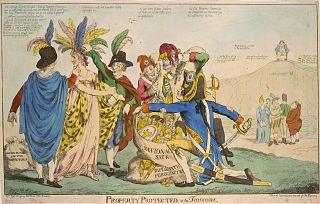 W
WThe Quasi-War was an undeclared naval war fought from 1798 to 1800 between the United States and France. Most of the fighting took place in the Caribbean and off the Atlantic coast.
 W
WThe 15th United States Infantry Regiment is a parent regiment in the United States Army. It has a lineage tracing back to the American Civil War, having participated in many battles.
 W
WAn Act further to protect the commerce of the United States, is an act of Congress approved July 9, 1798, authorizing the President of the United States to use military force in the Quasi-War with France.
 W
WThe Convention of 1800, also known as the Treaty of Mortefontaine, was signed on September 30, 1800 by the United States of America and France. The difference in name was due to Congressional sensitivity at entering into treaties, due to disputes over the 1778 treaties of Alliance and Commerce between France and the US.
 W
WThe Treaty of Amity, Commerce, and Navigation, Between His Britannic Majesty and the United States of America, commonly known as the Jay Treaty, and also as Jay's Treaty, was a 1795 treaty between the United States and Great Britain that averted war, resolved issues remaining since the Treaty of Paris of 1783, and facilitated ten years of peaceful trade between the United States and Britain in the midst of the French Revolutionary Wars, which began in 1792. The Treaty was designed by Alexander Hamilton and supported by President George Washington. It angered France and bitterly divided Americans. It inflamed the new growth of two opposing parties in every state, the pro-Treaty Federalists and the anti-Treaty Jeffersonian Republicans.
 W
WThe Logan Act is a United States federal law that criminalizes negotiation by unauthorized American citizens with foreign governments having a dispute with the United States. The intent behind the Act is to prevent unauthorized negotiations from undermining the government's position. The Act was passed following Senator George Logan's unauthorized negotiations with France in 1798, and was signed into law by President John Adams on January 30, 1799. The Act was amended in 1994, changing the penalty for violation from "fined $5,000" to "fined under this title"; this appears to be the only amendment to the Act. Violation of the Logan Act is a felony.
 W
WThe XYZ Affair was a political and diplomatic episode in 1797 and 1798, early in the presidency of John Adams, involving a confrontation between the United States and Republican France that led to the Quasi-War. The name derives from the substitution of the letters X, Y and Z for the names of French diplomats Jean-Conrad Hottinguer (X), Pierre Bellamy (Y), and Lucien Hauteval (Z) in documents released by the Adams administration.